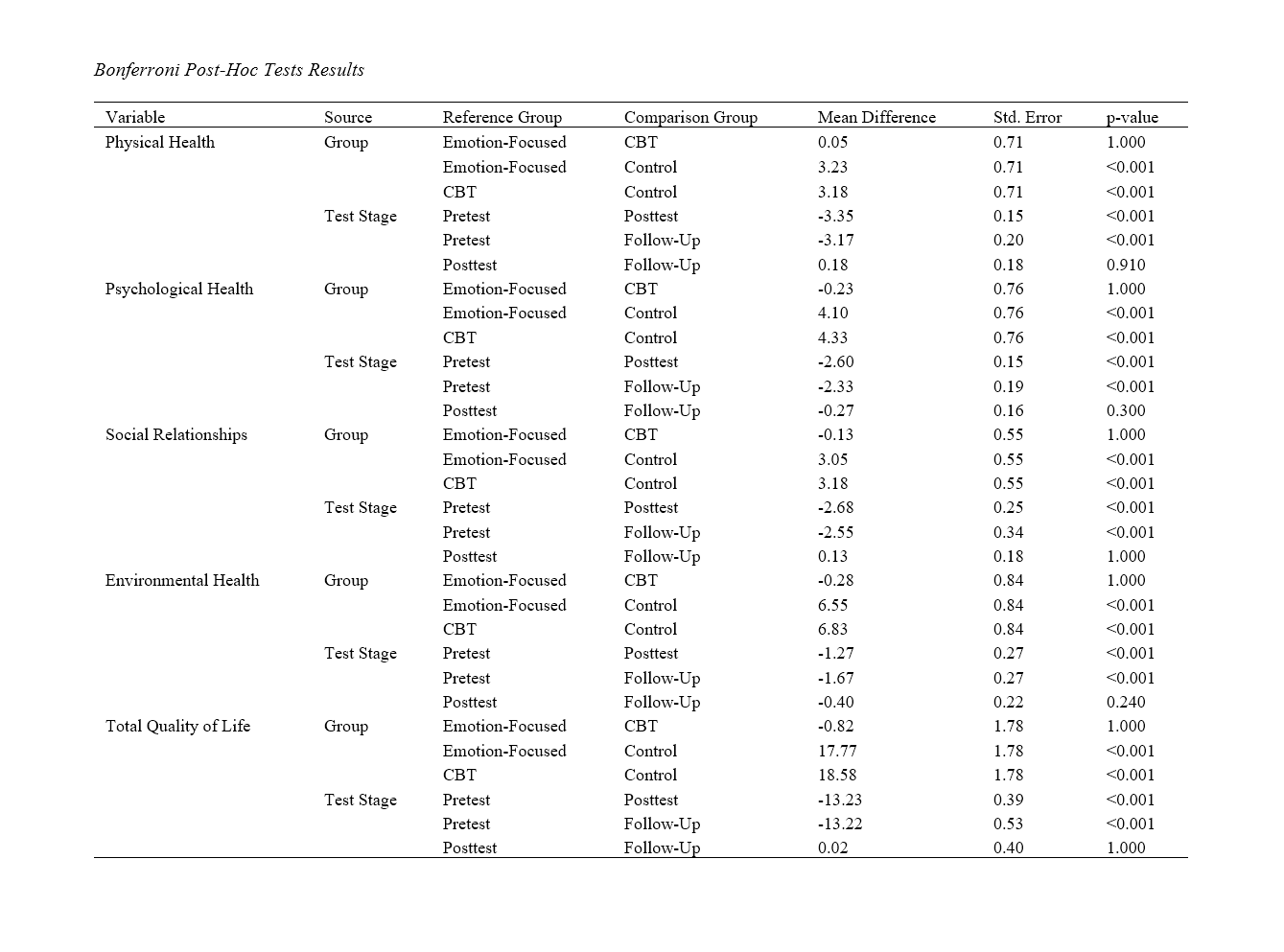Comparing the Effectiveness of Cognitive-Behavioral Therapy and Emotion-Focused Therapy on Quality of Life Components in Patients with Cervical Cancer
Keywords:
Cognitive-Behavioral Therapy, Emotion-Focused Therapy, Quality of Life, Cervical Cancer, Psychological InterventionsAbstract
This study aimed to compare the effectiveness of Cognitive-Behavioral Therapy (CBT) and Emotion-Focused Therapy (EFT) in improving quality of life in women with cervical cancer. A quasi-experimental design with a pretest-posttest structure and control group was employed. Seventy-five women with cervical cancer were purposively sampled and randomly assigned to three groups: CBT, EFT, and control (25 participants each). Both interventions consisted of 12 weekly group sessions. The quality of life was measured using the WHOQOL-BREF questionnaire across physical, psychological, social, and environmental domains. Data were analyzed using mixed-design ANOVA to evaluate the effects of the interventions over time and between groups. Bonferroni post-hoc tests were conducted to identify specific differences. The mixed-design ANOVA revealed significant main effects of test stages (F = 588.22, p < 0.001, η² = 0.91) and group membership (F = 69.55, p < 0.001, η² = 0.70), as well as significant interactions between test stages and groups (F = 168.24, p < 0.001, η² = 0.86) for the total quality of life score. Bonferroni post-hoc comparisons indicated that both CBT and EFT groups significantly outperformed the control group in all quality of life domains (p < 0.001). No significant differences were found between CBT and EFT (p > 0.05), and improvements were sustained at follow-up. Both CBT and EFT are effective in improving quality of life in women with cervical cancer, with comparable outcomes. These findings highlight the value of integrating psychological therapies into cancer care programs to address the multidimensional impacts of the disease and enhance patients' overall well-being.
Downloads
References
Ali Sari Nasirlo, K., Naderi, F., Homaei, R., & Makvandi, B. (2024). Efficacy of Mentalization-Based Treatment on the Self-Conscious Affect and Quality of Life among Mothers of Children with Intellectual Developmental Disorder. Journal of Applied Psychological Research, 14(4), 285-300. https://doi.org/10.22059/japr.2023.336809.644157
Bagheri Sheikhanghasheh, F., Farahani, H., & Esrafilian, F. (2023). The effectiveness of cognitive-behavioral therapy on psychological capital, tolerance of ambiguity, and quality of life in patients with chronic headaches. Second National Conference on Psychotherapy in Iran, Ardabil.
Dehesh, M., Rejeh, N., & Tadrisi, S. D. (2024). Fear of falling and quality of life in older hemodialysis patients in Tehran hospitals. Elderly Health Journal, 10(1), 1-6. https://doi.org/10.18502/ehj.v10i1.15959
Esmaeili, Z. (2023). The Effectiveness of Cognitive Behavioral Therapy on Corona Anxiety and Quality of Life in Older People. Iranian Rehabilitation Journal, 21(4), 731-742. https://doi.org/10.32598/irj.21.4.1940.1
Gillanders, D. T., Sinclair, A. K., MacLean, M., & Jardine, K. (2015). Illness cognitions, cognitive fusion, avoidance and self-compassion as predictors of distress and quality of life in a heterogeneous sample of adults, after cancer. Journal of Contextual Behavioral Science, 4(4), 300-311. https://doi.org/10.1016/j.jcbs.2015.07.003
Haghayegh, S. A., Adibi, P., & Davazdahemami, M. H. (2015). Efficacy of Emotion Focused Therapy on Quality of Life and Sleep in Irritable Bowel Syndrome [Emotion Focused Therapy, Irritable Bowel Syndrome, Quality of Life, Sleep Problems]. 2015, 20(3), 8. http://govaresh.org/index.php/dd/article/view/1400
Hedayati, M., Hajializadeh, K., Hedayati, M., & Fathi, E. (2021). An Investigation of the Effectiveness of Emotionally-Focused Couple’s Group Therapy (EFCT) on Relational Aggression of Couples with Breast Cancer in Wives: A Semi-Experimental Study [Research]. Iranian Journal of Breast Diseases, 13(4), 40-56. https://doi.org/10.30699/ijbd.13.4.40
Jalali, A., Pourhosein, R., Alipour, A., & Afrooz, G. A. (2023). Comparing the Effectiveness of Stress Management Method based on Cognitive Behavioral Approach and Self-Care Training and their Combination on the Quality of Life in People with Type 2 Diabetes. Health Psychology, 11(44), 167-188. https://hpj.journals.pnu.ac.ir/article_9553_5691a34c0e598088ffaad9ee2c5fdb1f.pdf
Jamalomidi, N., Hassani, F., & Kochakentezar, R. (2021). Comparison of the Effectiveness of Emotional Focused therapy with Cognitive Behavioral therapy on the Quality of life in Obese Women with Polycystic Ovary Syndrome. medical journal of mashhad university of medical sciences, 64(4), 3356-3368. https://doi.org/10.22038/mjms.2021.19462
Karbasi, F., Shahnifeiz, K., Rezaie, V. a., & Ostovarzadeh, M. (2024). Effectiveness of Positive Mindfulness Therapy on Mental Well-being, Quality of Life and Stress Coping Strategies in women With Bipolar Disorder. Psychology of Woman Journal, 5(2). https://doi.org/10.61838/
Khajeh, A. H., Farhadi, H., & Aghaei, A. (2022). Investigating the Effectiveness of a Combined Emotion-Focused Therapy and Compassion-Based Therapy Package on Marital Quality of Life and Attachment Dimensions of Couples. Applied Family Therapy, 10. https://www.aftj.ir/article_142271.html
Khazaei, F., Mirzahoseini, H., & Nokani, M. (2023). The effectiveness of cognitive-behavioral therapy on improving the quality of life of dialysis patients referred to dialysis centers of Tehran University of Medical Sciences. Journal of Applied Family Therapy, 3(5), 528-551. https://doi.org/10.22034/aftj.2022.332301.1435
Maj, A., Natalia, M., Agata, G., & Gerhard, A. (2023). The effect of internet-delivered cognitive behavioral therapy for depression and anxiety on quality of life: A meta-analysis of randomized controlled trials. Internet Interventions, 33, 1-13. https://doi.org/10.1016/j.invent.2023.100654
Majcher, M., Majcher, M., ŚWiercz, K., GÓRska, D., KarwaŃSka, A., Pikulicka, A., Małgorzata, S., Brzychczy, P., Kulbat, A., & Kulbat, M. (2023). The Impact of Education on the Benefits of Cognitive-Behavioral Therapy on Improving the Quality of Life of Patients After Breast Cancer Treatment. Journal of Education Health and Sport, 13(3), 46-50. https://doi.org/10.12775/jehs.2023.13.03.006
Mehraban, S., Jahandar, M., Hojjat Zadeh, Z., Toosi, M., & Ahmad Bukkani, S. (2022). The effectiveness of cognitive-behavioral therapy on the quality of life of patients with diabetes in Iran: A systematic review and meta-analysis. Diabetes Nursing Quarterly, 11(1), 2086-2099. https://jdn.zbmu.ac.ir/browse.php?a_id=576&sid=1&slc_lang=en
Najafi, M., Soleimani, A. A., Ahmadi, K., Javidi, N., & Kamkar, E. H. (2015). The Effectiveness of Emotionally Focused Therapy on Enhancing Marital Adjustment and Quality of Life among Infertile Couples with Marital Conflicts. International journal of fertility & sterility, 9(2), 238-246. https://doi.org/10.22074/ijfs.2015.4245
Razmpoosh, E., Mokhtari, M. J., Bassiri, M., Montazeri, A., Sajadian, A., Zarrati, M., & Salehi-Abargoueil, A. (2020). The Effects of Lifestyle Modifications Including Dietary and Physical Interventions With Cognitive-Behavioral Therapy on Quality of Life and Cancer-Recurrence Rate Among Patients With Breast Cancer and Survivors: A Protocol for a Systematic Review and Meta-Analysis of Randomized Controlled Trial. International Journal of Cancer Management, 13(9). https://doi.org/10.5812/ijcm.103647
Scott, H., Cheung, Janet M. Y, Muench, Alexandria, Ivers, Hans, Grandner, Michael A, Morin, Charles M, Perlis, Michael L. (2023). Baseline sleep characteristics are associated with gains in sleep duration after cognitive behavioral therapy for insomnia. Sleep Medicine, 102, 199-204. https://doi.org/10.1016/j.sleep.2023.01.009

Downloads
Additional Files
Published
Submitted
Revised
Accepted
License
Copyright (c) 2025 Elham Norouzi (Author); Ahmad Sobhani (Corresponding Author); Hamid Reza Nikyar , Hasan Rezaie Jamalouei (Author)

This work is licensed under a Creative Commons Attribution-NonCommercial 4.0 International License.







